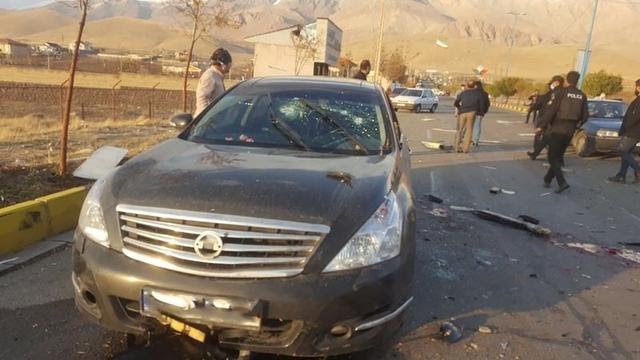Suspected Iranian nuclear mastermind Fakhrizadeh assassinated near Tehran
Dubai (Reuters) – An Iranian scientist long suspected by the West of masterminding a secret nuclear bomb programme was killed in an ambush near Tehran on Friday that could provoke confrontation between Iran and its foes in the last weeks of Donald Trump’s presidency.
The death of Mohsen Fakhrizadeh, who Iranian state media said died in hospital after armed assassins gunned him down in his car, will also complicate any effort by U.S. President-elect Joe Biden to revive the detente of Barack Obama’s presidency.
Iran pointed the finger at Israel, with the implication that the killing would have the blessing of the departing Trump.
Iranian Foreign Minister Javad Zarif tweeted of “serious indications of Israeli role” and called on Western countries to “end their shameful double standards & condemn this act of state terror”.
The military adviser to Iranian Supreme Leader Ayatollah Ali Khamenei vowed to “strike as thunder at the killers of this oppressed martyr”.
“In the last days of the political life of their … ally (Trump), the Zionists seek to intensify pressure on Iran and create a full-blown war,” Hossein Dehghan tweeted.
There was silence from foreign capitals. Israel declined to comment. In the United States, the White House, Pentagon, State Department and CIA all declined to comment. Biden’s transition team also declined to comment.
Fakhrizadeh has been described by Western and Israeli intelligence services for years as the leader of a covert atomic bomb programme halted in 2003, which Israel and the United States accuse Tehran of trying to restore in secret. Iran has long denied seeking to weaponise nuclear energy.
“Unfortunately, the medical team did not succeed in reviving (Fakhrizadeh), and a few minutes ago, this manager and scientist achieved the high status of martyrdom after years of effort and struggle,” Iran’s armed forces said in a statement.
The semi-official news agency Tasnim said “terrorists blew up another car” before firing on a vehicle carrying Fakhrizadeh and his bodyguards in an ambush outside the capital.
Regardless of who was responsible for the attack, it is certain to escalate tension between Iran and the United States in the final weeks of Trump’s presidency.
Trump, who lost his re-election bid to Biden on Nov. 3 and leaves office on Jan. 20, pulled the United States from a deal reached under Obama, his predecessor, by which sanctions on Iran were lifted in return for curbs on its nuclear programme.
Biden has said he will aim to restore that agreement, although many analysts say this would not happen overnight, with both sides likely to demand more reassurances.
A U.S. official confirmed earlier this month that Trump had asked military aides for a plan for a possible strike on Iran. Trump decided against it at the time because of the risk it could provoke a wider Middle East conflict.
Last January, Trump ordered a U.S. drone strike in Baghdad that killed Qassem Soleimani, Iran’s most powerful military commander. Iran retaliated by firing missiles at a U.S. base in Iraq, the closest the two foes have come to war in decades.
‘Remember That Name’
Fakhrizadeh is thought to have headed what the U.N. nuclear watchdog and U.S. intelligence services believe was a coordinated nuclear weapons programme in Iran, shelved in 2003.
He was the only Iranian scientist named in the International Atomic Energy Agency’s 2015 “final assessment” of open questions about Iran’s nuclear programme. The IAEA’s report said he oversaw activities “in support of a possible military dimension to (Iran’s) nuclear programme”.
He was a central figure in a presentation by Israeli Prime Minister Benjamin Netanyahu in 2018 accusing Iran of continuing to seek nuclear weapons.
“Remember that name, Fakhrizadeh,” Netanyahu said at the time.
During the final months of Trump’s presidency, Israel has been making peace with Gulf Arab states that share its hostility towards Iran.
On Friday, before the news of the attack on Fakhrizadeh emerged, an Israeli official said Israel was discussing with Gulf Arab states how to tackle Iran.
“The story is not Trump, nor even Israel. The story is Iran – the growing dread that a new U.S. administration will go back to the nuclear deal which threatens the very existence of the Gulf countries,” Tzachi Hanegbi, who sits in Netanyahu’s security cabinet, told Tel Aviv radio station 102 FM.
“We will know how to handle the issue of the Iranian threat, even if through our own means.”



